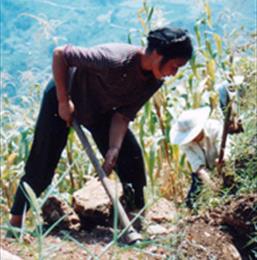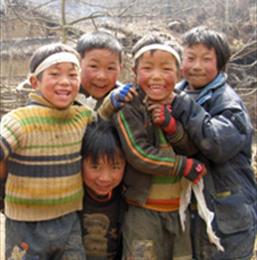Apr/May 2006
31st May 2006
Big White Bean Loans
Chalin Village
For the past four years DORS has been providing loans to villagers in one hamlet of Chalin Village. Villagers' largest single source of income there is from growing big white beans which are particularly suited to their local environment. Unfortunately these beans require something to climb in order to achieve reasonable production. Villagers use bamboo cane and, though they are individually quite inexpensive, a single household will use tens of thousands of these canes each year. The canes can be reused for about 3 years before they deteriorate from exposure to the elements. Villagers' sole constraint to increasing big white bean production is the lack of capital to purchase stocks of canes (land is abundant and previous years crop can be used for seed). Last year DORS had loaned a total of 13,000 RMB to 13 households to aid them in purchasing canes, in April these loans were repaid in full. During May DORS disbursed a further round of loans to Chalin villagers and collected some basic statistics on the borrowers' big white bean production. Between this year and last the median increase of big white bean planting among borrowers is over 1/3. Our goal is that villagers are able to expand their production to a level at which they will be able to use a portion of their previous year's income to reinvest in cane. If nature cooperates villagers should be able to achieve this.
Integrated Rural Development Projects
Wenzeluo Village Electricity Project
During April the Wenzeluo Electricity Project was completed. Township leader Wang had tirelessly coordinated implementation since signing the contract and made sure that progress proceeded according to the terms outlined in the contract. 92 households in four hamlets benefited from the project (several households have moved away) and DORS contributed 70,000 RMB towards the project, the Ganluo County Poverty Alleviation Office, County Government and Electric Company provided over 80,000 RMB in direct funds and technical direction, and villagers contributed labor.
Animal Husbandry
Pure-Bred Rams
When formulating their village development plans Sanshihu, Shishier, and Shuangmacao villagers all wanted to focus a majority of the development funds on animal husbandry projects, particularly sheep. After implementing sheep raising training, pen building, and ewe purchasing projects, and having villagers set land aside to grow grass for winter fodder, DORS has helped villagers purchase Banximao pure-bred rams. Depending on the size of their herds groups of 2-5 households share ownership and responsibility for the care of a ram, which when bred with locally bred ewes will have offspring that grow faster, larger, and are more disease resistant.
Daying Village Water Supply Project
During May DORS volunteers began another round of water supply projects in five separate areas of Daying Village. Two of the groups had water systems which were incomplete or in extremely poor repair, two needed complete systems designed, and one requested that we help connect an existing system to a new water source as their system had run dry during the winter months. After measuring the flow rate for each of the water sources and determining that they would be sufficient for the number of households using them, DORS volunteers designed systems and estimated costs for necessary repairs. Villagers were required to discuss amongst themselves and devise a maintenance agreement to ensure consistent upkeep as well as a labor agreement for the installation of the systems. Villagers from each group contributed 10% towards the cost of each system and handed over an additional 10% which DORS will return when the villagers have successfully fulfilled their responsibilities as outlined in our contract. One of the systems has already been completed and the others are scheduled for completion by July.
School Repairs in Shiquan Village
The primary school in Shiquan Village was built in 1989. It serves both Shiquan Village children as well as several students from neighboring Dawei Village. When we worked with villagers to formulate a village development plan they stressed the need to improve the condition of the school and the students learning environment. The building has some structural problems; several windows frames are falling out, water is leaking into one of the classrooms through the roof and one side of the foundation. In addition, the classrooms are quite dark and bitterly cold during the winter (windows are uncovered and the elevation is about 2000 meters). During April DORS signed a contract with Shiquan villagers for just under 7000 RMB for various school repairs. Villagers will provide labor and locally available materials while DORS funds will be used for materials and to hire a carpenter. Repairs include: installing new windows with glass panes, plastering and whitewashing the interior, resurfacing the roof, and installing drainage channels around the foundation. These changes will improve the learning environment for primary students of Shiquan Village and ensure the village will be able to use the school for many years to come.
Cement Pathways in Shuangmacao Village and Ladai Village
Due to frequent rain, poor drainage, and abundant livestock the pathways in most villages are covered in thick mud with standing fetid water throughout much of the year. Residents in two of our integrated project villages in Ganluo County had decided to use part of their village development funds to build cement pathways to solve the problem. DORS volunteers had worked with villagers to devise and estimate of the materials and transport costs and created a budget for the project. Villagers wrote up labor and maintenance agreements and also contributed to the cost of materials. Both villages should finish their village pathway construction projects by the end of August.
DORS News and Information
Recruitment During April and May
DORS posted vacancy notices for three new volunteers. After receiving over 30 applicants current volunteers have interviewed several candidates and will conduct a second round of interviews in the coming week.


